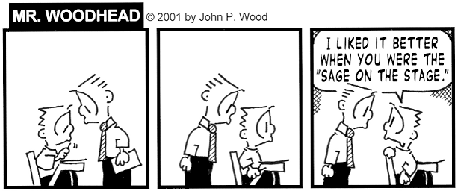|
 |
| Teachers.Net Gazette Vol.6 No.3 | March 2009 |
Subscribe for free home delivery |
|
Teachers’ Role in Improving Students’ Thinking Skills: Moving beyond the ‘sage on the stage’ | ||
| by Ambreen Ahmed Continued from page 1 March 1, 2009 |
||
|
Teacher as a Peer  I wonder … (thinking aloud) Challenging a view point becomes particularly important with high ability students who can benefit with teacher assuming the role of a peer. As one teacher, commenting on the discussion she had with a high achiever said, “Dominic had to know that it was not just a game: that I really did mean what I said, but he also needed to know that he could reject what I said and to give back as good as he got, and he did didn’t he! I think it was useful because I challenged him in a way that may be his peers, especially friends won’t. High ability students like Dominic need a critical, informed audience, but one they can respond to openly as well.” (Excerpt taken from Corden, 2001, p.380) Teacher as an Evaluator When teachers observe small groups of students engaged in talk, they have an invaluable opportunity to assess their understanding. To quote Cooper (2002, p.55), “throughout the process, the teacher has opportunities to probe students’ understandings while they are fluid, and to make corrections at favorable moments”. As an evaluator, the teacher deliberately uses indirect language that helps students take an overview of what they have achieved and also encourage them towards taking considering alternate routes. Some helpful language markers for this stage could be That sounds really interesting…. So think about what your next step might be. (Validating and focusing) This article has discussed some roles and the associated verbal behavior that teachers can integrate in their repertoire. Teachers have the power to influence the ways in which children learn. Modeling appropriate verbal behavior that probes, reflects, challenges, suggests and validates can help children learn new ways of thinking and interacting with each other.
REFERENCES Cooper, S. M. (2002) “Classroom choices for enabling peer learning”. Theory into practice, 41 (1), 53-57 Corden, R. (2001) “Developing exploratory language in the classroom: Moving beyond teacher as an expert”. Educational Research, 9, 371-393 Duminy et al. (1992) Teaching practice. Pearson South Africa | ||
|


